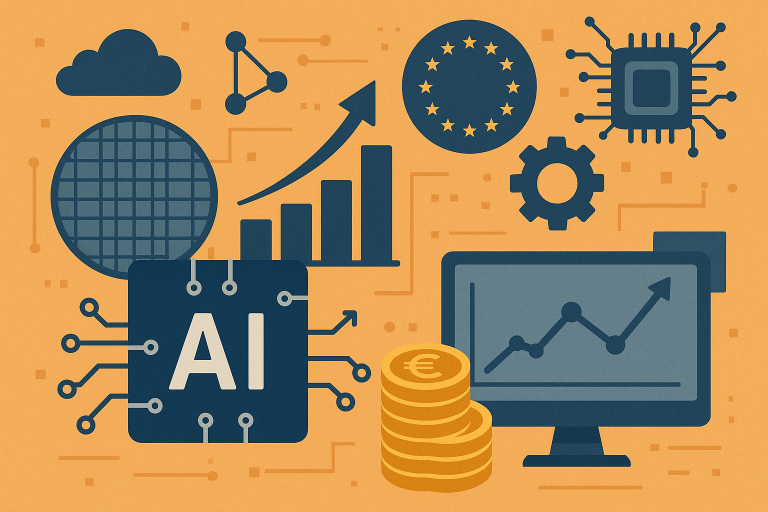Europe’s technology sector is delivering its best quarterly performance in years, powered by soaring investment in artificial intelligence that has reignited demand across chipmakers, software firms, and network suppliers.
Bloomberg reports that the MSCI Europe Technology Index has recorded earnings-per-share growth of 16% so far this quarter, with 86% of its market capitalisation already reporting.
This outcome, well above pre-season expectations of 4.2%, places tech far ahead of other European sectors and highlights how AI infrastructure spending is countering trade uncertainty and supply disruptions.
AI infrastructure spending boosts chip equipment makers
Semiconductor equipment leaders have been the earliest beneficiaries of the AI surge.
ASML Holding NV, the Netherlands-based manufacturer of advanced chipmaking tools, reported a sharp rise in orders for its most sophisticated lithography machines as demand for AI-related hardware accelerated.
The jump eased investor concerns about a potential slowdown in 2026.
Similarly, BE Semiconductor Industries NV recorded stronger-than-expected profits and a surge in orders, supported by demand from Asia’s AI data-centre market.
The data underscores how European chip suppliers, once viewed as vulnerable to a global slowdown, are now capturing a larger share of the AI capital-expenditure cycle.
Cloud software and telecoms join the growth momentum
While hardware has driven the early rebound, software and communications companies are also gaining from the AI rollout.
SAP SE, Europe’s most valuable software company, posted mixed results for its key cloud division as client decisions slowed under trade tensions and a weaker US dollar.
Yet adoption of AI within its services reassured investors, reflecting an industry-wide pivot toward automation and analytics.
In the telecom space, Ericsson AB’s third-quarter profit rose on the sale of its call-routing business, and Nokia Oyj’s profit exceeded forecasts.
Nokia’s expansion has been fuelled by AI and cloud clients, with data-centre connectivity and fibre-access demand in the US providing a new source of growth.
The AI super-cycle reshapes sector forecasts
Rising optimism around the so-called AI super-cycle is prompting analysts to lift earnings estimates for European tech after months of downgrades.
Bloomberg noted that stronger demand for transport networks and data-centre infrastructure is underpinning higher sales projections for Nokia.
The shift follows OpenAI Inc.’s data-centre and chip procurement deals now valued at over $1 trillion, which are cascading through supply chains.
For Europe, this has created a unique position: suppliers and service providers are benefiting from global AI spending without the same regulatory constraints that have slowed US and Chinese rivals.
Supply chain and trade tensions remain key risks
Despite the positive earnings trend, risks persist. The global chip supply chain remains exposed to geopolitical friction between the US and China.
Washington continues to restrict exports of advanced AI chips to Beijing, while China has responded by limiting rare-earth exports critical to semiconductor production.
Companies such as STMicroelectronics NV have signalled weaker orders from automotive and industrial clients, mirroring similar caution from Texas Instruments Inc. in the US.
The slowdown in car demand adds another layer of pressure, with the Dutch government recently taking control of Chinese-owned Nexperia, heightening concerns over strategic assets.
Even so, analysts expect AI-related orders to filter through the supply chain in 2026, offsetting short-term weakness in consumer and automotive markets.
Citigroup research indicates that many AI hardware and chip deals have yet to materialise in equipment spending but should begin converting into tangible orders soon.
Europe’s AI-driven tech rebound gains traction
The third-quarter results confirm that Europe’s technology sector is outperforming peers amid a broader economic slowdown.
AI remains the common thread linking chipmaking, cloud software, and telecom infrastructure, driving both investment and employment growth.
As the AI cycle deepens, the region’s leading firms appear set to maintain momentum, even as trade tensions and component shortages persist.
The post European tech earnings surge as AI demand powers strong Q3 rebound appeared first on Invezz

